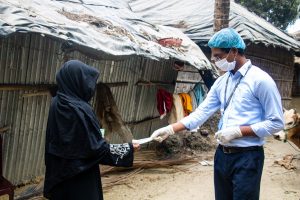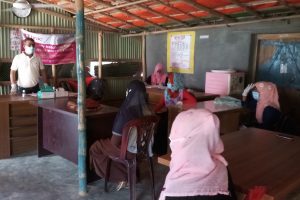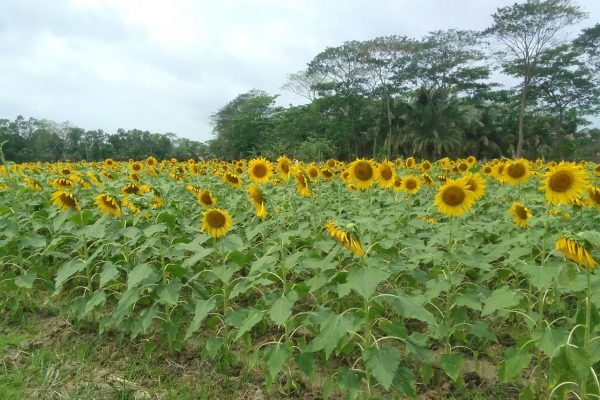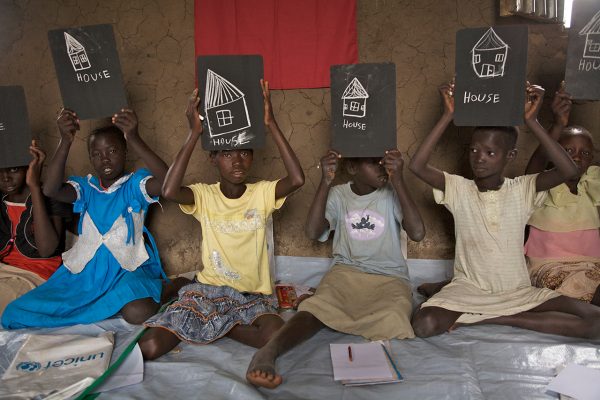COVID-19: Update from Asif Saleh (16 May 2020)
Reading Time: 6 minutes
Bangladesh’s public healthcare system is at a breaking point, and the first two cases of COVID-19 have been identified in the Rohingya camps in Cox’s Bazar. Read the latest about the pandemic in Bangladesh.
Dear colleagues, partners and friends,
I am deeply saddened to share the passing of our esteemed colleague, Brigadier General (Retd) Aftab Uddin Ahmad, Director of BRAC’s skills development programme. He was admitted to a hospital with respiratory stress and had tested positive for COVID-19. Mr Ahmed is the first colleague whom we lost to COVID-19.
We are indebted for his guidance and leadership since he joined BRAC. He will be remembered for his unparalleled dedication to his work, and long-standing commitment to public service in Bangladesh.
For more information about Mr Ahmad, please see here.
Personally, this has been very difficult to accept for me. Mr Ahmed, known as Aftab bhai to us, was a dedicated, sincere and jovial addition to our senior leadership team. He would join all the daily coordination calls and work with us to ensure we are doing as much as we can to protect the vulnerable from this virus. His family also dealt with the classic conundrum that most families with sick members are dealing with now in Bangladesh; to seek or not to seek admission in a hospital filled with COVID-19 patients. Where to get the right advice?
This has not been an easy week. The public health care system is at a breaking point. A senior level government official died on 9 May as hospitals, one after another, refused to admit him. With the onset of dengue, the state of healthcare during the next few weeks looks ominous. BRAC contributed a little bit to ease the testing conundrum by starting 10 kiosks this week. We plan to start 40 more in the very near future in Dhaka Division, the epicentre of the outbreak in Bangladesh.
Our site selection is very much guided by DGHS, which is prioritising the hotspot areas in the initial stage. We will sign an MOU with them this week. We can scale up the kiosks to 600 provided we can mobilise the resources. For the initial 100, we are repurposing some of our existing funds to help with the effort.
BRAC’s effort to support Bangladesh managing the outbreak were featured today in PBS. The feature contains an interview with me.
Some local shops and markets reopened this week, for a limited time, and the gradual exit from lockdown began. Apart from some minor glitches, Aarong, BRAC’s flagship social enterprise (which reopened on 10 May) managed the reopening, ensuring the safety protocols and crowd control through its online booking system in 14 out of its 21 outlets. Some pictures of the reopening steps can be found here. Microfinance also started limited operations across the country. Cash disbursements for businesses will be key to jumpstart the rural economy. The process started well. Please read our senior director Shameran Abed’s blog piece on BRAC’s view on three phases of response — relief, recovery and rebuild, and for investing in microfinance for rebuilding post COVID-19.

Guidelines are coming out from the government, about what the new normal will look like. DGHS issued a detailed guideline last week on how things should be in every sphere of our lives. The guideline is very comprehensive. Without active communication and providing handholding support to various responsible groups and stakeholders though, we are likely to see another messy reopening. Here is the complete guideline in Bangla.
This week marked the announcement of the government’s unconditional cash transfer of BDT 2,500 to 5 million households via mobile financial services (MFS). While the delivery mechanism through MFS at such a large scale is revolutionary, the targeting process was traditional and depended on local political administration to identify the deserving. The announcement by the PM was widely welcomed by everyone, but the accuracy of the targeting will only come out in the next few days, and a handful of blunders may put the entire effort into question.
From this week onwards, we will be sharing more insights from our colleagues in the field, who have been providing – and will continue to provide – life-saving services across all 64 districts of Bangladesh throughout the pandemic. We will be sharing not only the work they are doing, but what they are seeing and learning, and how our activities are adapting in response to the changing situation on the ground.
Read more: Manoshi: Ensuring maternal care in a pandemic
This week, I want to share my thoughts on three current topics in Bangladesh;
The first two positive cases of COVID-19 have been identified in Cox’s Bazar’s Rohingya camps. One of the patients is from Kutupalong refugee camp, and the other patient is from Camp 1E. Both of them have been assigned to isolation. So far, 121 people have tested positive in the district of Cox’s Bazar. 71 people are in institutional quarantine in the camps, as well as 272 people in institutional quarantine and 475 people in home quarantine in the host communities.
Over a million people are living in the camps, which have limited healthcare facilities and no intensive care beds. Authorities are planning to isolate almost 2,000 people who may have come in contact with the persons infected. BRAC runs three isolation centres with a capacity of nearly 200 people. Currently, 27 people are staying at BRAC-run isolation centres.
Infected versus affected: The importance of both groups. While our attention should be on those who are infected by the virus, we should not forget about those who are indirectly affected. The closure of educational institutions has disrupted learning for some 30 million students.
This threatens the gains that Bangladesh has made in primary school enrolment, and raises serious concerns about the situation in secondary schools. The proportion of children in secondary schools in Bangladesh was already the lowest in South Asia. The net enrolment rate in secondary education was only 50%, with the secondary school cycle not completed by 75% of students. The situation is even tougher on girls – the rate of girls dropping out of sixth and seventh grade was more than double compared to boys. Early marriage – the biggest threat to girls dropping out – is being seen as the only option amidst COVID-19.
Children are often the most vulnerable as their families deal with the stress of uncertainty and the unfamiliar circumstances of lockdowns in their areas. Educational institutions are trying to continue learning remotely through various initiatives, but lack of internet access, particularly in rural areas, presents challenges. Most low-income households do not have access to the internet and have limited access even to basic phones – there is often just one phone and it is solely carried by the father in a family. BRAC is supporting the government’s TV schooling initiative for students in government-run schools, running classes through basic phones with small groups of students and their families, and integrating supportive psychosocial messaging into the curriculum. For more, please read here.
The positives of COVID-19: What we have learnt and how the changes made to systems can help Bangladesh move forward. The crisis has caused massive disruptions in the country, but it has also pushed systems to adapt in ways that could lead to real improvements in efficiency in Bangladesh, which should continue after the crisis ends.

We need to look into and document good practices, and adjust systems and structures permanently. Examples include Bangladesh launching e-justice this week, lawyers filing pleas for hearing in courts remotely, and more than 1,000 people granted bail across the country on the third day of virtual court proceedings. The initiative was stalled for three years since the Supreme Court proposed to start it in 2017. More than 3.5 million cases were backlogged (3 million in lower court and 500,000 in the Supreme Court) up until April 2019. Many other organisations and government departments are also rapidly shifting processes online, such as the Bureau of NGO Affairs, which is improving transparency and lead time through processing approvals by email.
Citizen behaviour is also undergoing dramatic shifts. People are increasingly opening bank accounts, using mobile money and turning to mobile applications and hotlines for information. On the negative side, we have also seen the creation of an ‘info-demic’, with rampant misinformation available on and offline. For more details on this, please see the report.
At BRAC, we have started reviewing the changes we have made to our programmes to remain effective during COVID-19, to identify the efficiency gains that will be implemented permanently. As an example, we found out that the virtual town hall meetings that we started during the pandemic to keep in touch with the field is a practice that we are going to continue. Yesterday I held a town hall where more than 1,000 colleagues from across the country participated, and – despite the lack of face to face contact, there was an extremely high level of engagement and positive feedback.
The new normal will be challenging, but it needs to be planned well. In a recent interview, the health minister of Kerala said the secret for Kerala’s successful handling of COVID-19 lied in proper planning and execution.
See this week’s full report here. If you want to see any particular issue covered, please let us know at covid19response@brac.net.
Asif Saleh is the Executive Director of BRAC Bangladesh.





